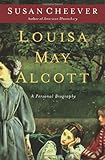Earlier this year when I visited Orchard House, Louisa May Alcott’s home in Concord, Massachusetts, I was surprised to find that a considerable gathering of people was already in line when I arrived promptly at opening time. I shouldn’t have been: every year, the house hosts over 50,000 visitors. Later, when my brother and I made our pilgrimage to Concord’s Sleepy Hollow cemetery to see the graves of Alcott, Hawthorne, Emerson, Thoreau, and their families, it was Alcott’s grave that was strewn with stones and flowers and stories, stories written in childish hand by young girls inspired by Little Women—a novel whose influence has extended through generations of readers, particularly women who strongly identify with the story of Jo, Meg, Amy, Beth, and their Marmee.
Though Alcott’s work has remained popular with readers since its publication in 1868, critical interest in her life and work has undergone something of a revival in the past few years: from Geraldine Brooks’ reimagining of Little Women in March (2005) to John Matteson’s Eden’s Outcasts: The Story of Louisa May Alcott and Her Father (2007)—both of which won the Pulitzer Prize; from Harriet Reisen’s Louisa May Alcott: The Woman Behind Little Women (2009) to Richard Francis’ Fruitlands: The Alcott Family and Their Search for Utopia (2010).
Susan Cheever’s Louisa May Alcott: A Personal Biography, then, joins a very crowded field—made even more crowded by Cheever’s own earlier group biography, American Bloomsbury: Louisa May Alcott, Ralph Waldo Emerson, Margaret Fuller, Nathaniel Hawthorne, and Henry David Thoreau: Their Lives, Their Loves, Their Work (2007). In her latest work, Cheever’s operative words are “personal biography,” suggesting not only a rather narrow focus on Alcott herself (and not a wider family portrayal beyond Alcott’s father, Bronson) but also, more significantly, a biography read through Cheever’s own life and history, often with her own difficult father, the writer John Cheever. The book is also characterized by Cheever’s frequent (and prolonged) philosophizing, particularly about the nature of writing, which readers will find either enlightening or annoying, depending on their tolerance for passages such as this:
What makes someone want to be a writer? Clearly, one thing this dream requires is a ferocious hunger, a hunger for recognition, a yearning to be heard that roars through the soul with a sound so great that the stories often feel as if they are discovered rather than invented. Writing also requires a kind of divine perversity. The writer stands outside the conventional world looking in with a vision sharp enough to describe things in ways that are both recognizable and entirely surprising. Good writing is almost always subversive. It uses the nuts and bolts of the texture of everyday life to communicate truths that may be as disturbing as they are original. There is often a lot of anger in great writing; no one likes to be outside, the one left behind to tell the story, but a writer must learn to live out there in the cold, warmed only by her ability to write.
Hence, this study’s combination of biography, autobiography, and meta-discourse yields a curious mix of fact, speculation, and opinion—as often interpreted through Cheever’s experience as through Alcott’s. To be fair, Cheever sets the book up quite deliberately to foreground her own reactions and openly signals her conjectures and judgments. Readers will have to decide if they are drawn in or distracted by Cheever’s very active presence in the book. But whatever else this hybrid model of life-writing does, it demonstrates the continuing allure of using Louisa May Alcott’s life and works to help readers critique the dominant narratives presented to them and to assist them in constructing new ones. That’s powerful stuff.
No wonder there was a line to get into her house.
Copyright © 2012 by the author or Christianity Today/Books & Culture magazine.Click here for reprint information on Books & Culture.










